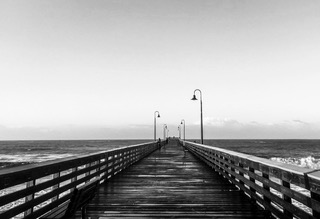Journaling Questions | COVID-19 Conversations with Pat & Tammy McLeod
April 14, 2020Having & Not Having | COVID-19 Conversations with Pat & Tammy McLeod
April 16, 2020Restless
By Ron Sanders, Campus Minister with Cru at Stanford University, Associate Faculty in Christian Ethics at Fuller Theological Seminary
“Although ambiguous loss is also traumatic stress, the core issue is unresolved loss and the ongoing ambiguity that causes a pain that never lets up. The torture lies in being kept in the dark.” (Pauline Boss, Loss, Trauma, and Resilience, 6. Emphasis mine)
“The human brain is limited in its ability to pay attention to and process information…to cope with this…we become cognitive misers.” (Christena Cleveland, Disunity in Christ, 45)

My son is home from college. His laugh fills our 1300 sq. ft. home (even when he is in his room with all the doors shut). He laughs a lot. People send him memes, he laughs; he Zooms with his friends, he laughs. Sometimes his “squad” or his “herd”—they are different with some crossover—chooses sides and they will go “shirts and skins” for their Zoom call…boys! (Sorry, young men). We watched Trolls 2 on Saturday…he laughed for an hour-and-a-half. He hangs out with his sister, they both laugh. He is being good about the social distancing thing. But he is getting restless. He is an extrovert; he likes to be around people.
So, it has come to this. He stands in the corner of our yard and his friends walk by on the street. They talk for about 10-15 minutes—mostly laughing—and then retreat to their shelters.
My daughter is home from high school. Her energy fills our 1300 sq. ft. home. She is used to the daily rhythm of school, several hours of gymnastics practice per week, being involved in Young Life, and hanging out with her friends on the weekend. If she has space in her schedule, she usually invents some kind of art project. Or makes peanut-butter chocolate chip cookies. She is mostly “on the go.” She is being good about the social distancing thing. But she is getting restless. She is an introvert; she likes to be around her few close friends.
So, it has come this. She will go on a “social distance walk” with one of her friends. They walk at least 6 feet apart—catching up—and then retreat to their shelters.
We had a conversation at the dinner table last night about how long our shelter in place restrictions will last (we all agree that we want it to last long enough for everyone to be safe). One of my nephews is getting married in May, and the wedding kind of forces the question on us. We want to be there to celebrate and welcome a new person into our family. My prediction was into June…others were more hopeful that it might end earlier. But we would like to have some sense of “knowing.”
One of the problems of being in the middle (I hope it’s at least the middle) of a global pandemic is that the ending is ambiguous—we can’t see it—and ambiguity causes stress. The quotes above reflect this stress: “the torture lies in being kept in the dark” and the nagging need to have some “cognitive closure.” It’s not easy not knowing. And the longer it goes, the more difficult it gets.

I have been reading a lot about resilience in times of crisis; and trying to draw on some past experiences where I’ve shown some ability to find my way through the night. A consistent theme across the theoretical reading and my experiences is coming to terms with tension and not trying to manufacture “cognitive closure” when it isn’t possible. Real closure with ambiguous losses comes with a kind of “acceptance” about the things I can’t control.
My faith helps me in this acceptance. Not that everything will turn out ok for me or my family (I can’t know that). Not that God caused a pandemic (I don’t believe that). But that God can be present with me through the restlessness that comes with “not knowing.” One of my favorite verses from my early Christian experience is Hebrews 13.5 “…for he has said, ‘I will never leave you or forsake you.’” I have added theological depth to that verse as I have grown in my faith, but it still means something similar as it did then—that God is present, even when my questions and doubts seem to cloud my ability to notice it.
Photography by Bonnie Sanders
